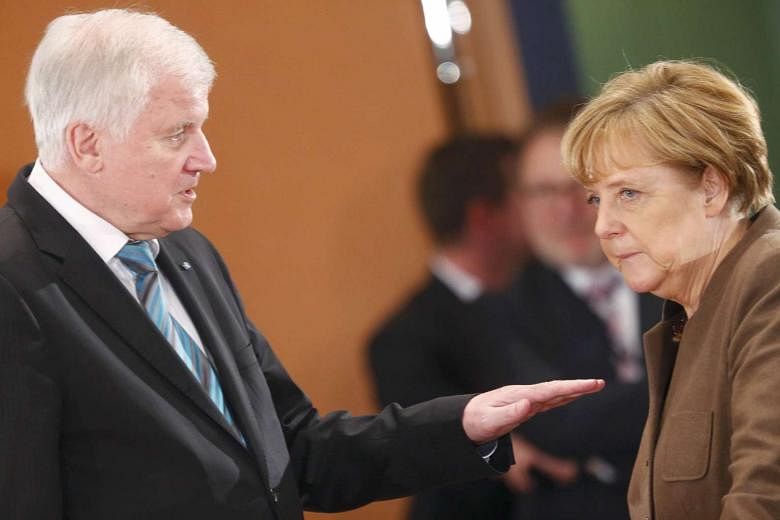BERLIN • German Chancellor Angela Merkel has reached a deal with her coalition partners to manage the flood of refugees into the country, defusing - for now - a row that had threatened her leadership.
While the plan agreed on Thursday would ease deportations and restrict family reunions, the test for Dr Merkel is whether the measures will reduce the country's biggest influx of asylum seekers since World War II and boost support for her Christian Democratic Union (CDU), which is at the lowest levels since the last election in 2013.
"I feel fortified following the results," Dr Merkel said at a press conference in Berlin. "We are getting a lot of things accomplished."
With public backing for her open-door policy waning and Germany's European partners reluctant to help deal with the crisis, Dr Merkel was under growing pressure to resolve a political brawl in her three-party coalition that intensified after New Year's Eve sexual assaults on women in Cologne.
Looming over Thursday's meeting was a threat by the Christian Social Union (CSU), the CDU's Bavarian sister party, to challenge Dr Merkel's policy in the constitutional court. The deal, meant to reduce the inflow of asylum seekers after more than one million poured in last year, expands the list of countries deemed safe for refugees to return to and bars families of some refugees from joining them in Germany for two years, said Vice-Chancellor Sigmar Gabriel, who heads the Social Democratic Party.
Dr Merkel, Mr Gabriel and Bavarian Premier Horst Seehofer, who heads the CSU, hammered out the deal after weeks of feuding over how to handle the influx as the Chancellor seeks to defend passport-free travel in the EuropeanUnion. They now have to sell the deal to their constituencies in order to get it through Parliament.
Bavaria's threat to sue Dr Merkel's government prompted the first public warning by a senior politician that the coalition could collapse. Mr Thomas Oppermann, the Social Democrats' leader in Parliament, accused Mr Seehofer of seeking to break up the coalition.
Thursday's deal widens the list of so-called safe countries to include Morocco, Tunisia and Algeria.
"We want to integrate those who look like they will be allowed to stay, but we will need to send home those who don't look like they'll be able to remain," said Dr Merkel, who won renewed public support on Thursday from Finance Minister Wolfgang Schaeuble, who ruled out a cap on migration.
"It's going slowly, that's true, but the Chancellor is working tirelessly," Mr Schaeuble told the Stuttgarter Zeitung newspaper. "I support her in this with everything I have."
Germany's stance is under growing pressure from other EU countries that are seeking to limit migration, such as Sweden and Austria.
Sweden, which has tightened border controls as it struggles with the influx, on Thursday said it may reject almost half of the 163,000 asylum seekers who entered the country last year.
BLOOMBERG

